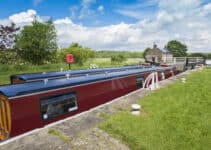Welcome back to Canal Boat UK, today I thought I would post about my top tips for narrowboating or canal boating in the Winter. The UK Winters can be pretty brutal if you don’t know what you are doing, hopefully with some simple tips it will make your path somewhat smoother.
If you have any tips of your own, be sure to leave a comment below and I may even add them to the article 🙂
Tip 1: Make Sure Your Boat is Winter Ready!
This first tip is aimed at people that have just bought a narrowboat and are new to the world of canal boating!! Make sure the boat you have bought is ready for Winter if you plan to live on it.
The problem I have seen a lot is people that have bought narrowboats that are ex-hire boats or from leisure cruisers. When a narrowboat is from these places, they are often only used when the weather is warm. This would mean they have never faced a Winter and might have inadequate systems in place to deal with one.
Heating is the main one, naturally. Most people will find a multi-fuel stove on their boats is more than enough for a lot of the Winter cold. However, most narrowboats have other heating systems that run alongside this. Usually it would be a set of radiators with an attached water heater. Do you have one? Have you ever tried it? The other thing is to make sure you have enough storage space to store enough fuel for your multi fuel stove.
Alongside heating is your boat’s insulation. To be fair, it is hard to tell what type of insulation your boat may have and even harder to change it if found lacking. The most you would probably do here is make sure your boat is as airtight as possible. Check window seals and make sure all windows or portholes have bungs, curtains or blinds to help stop hot air escaping. Although condensation is more likely when the weather is colder, so you should have ventilation ducts you can open and close when you need as well.
Finally, if you use solar power and rely on it in any major way, have you ever tested it in Winter? Your electricity production will probably be somewhat down on what you are used to when it’s sunnier. If you think you are going to be lacking in power, start thinking about what your back up power plans are. You could buy a generator like the one below if you are short (which would mean you don’t always have to start your engine to charge, thus saving on maintenance costs).

The problem you might have with a generator though is that most of the compact ones use Petrol, meaning you have an extra fuel you need to store safely and within regulations on your boat. If you are still interested, you can click the image above to go look at the options over at Amazon.
Tip 2: Are You Ready for a Dip?
The Winter is the worst time to fall in the British canals, as the water is much colder and could be harder to get out of when icy. Whenever you set off cruising, make sure that you are prepared for if this may happen.
- Make sure your boat’s fire is either roaring away or ready to be quickly lit.
- Have a dry change of clothes ready.
- Think about your escape plan. Do you have a ladder or something that could help you get out faster?
- Do you have hot water for a hot shower? It’s a great way to heat back up after a detour into the cut 🙂
Tip 3: Are You Insured?
Make sure that whatever insurance you buy has full coverage for whatever activities you plan in the Winter. You would be surprised how many people forget to check this.
Tip 4: Mind Your Step!
Not only will your canal boats decks be slippery in the Winter, if you are cruising the locks and lock landings can be literal ice rinks when it’s really cold!
When in locks, don’t rush. Take your time and make sure you have good footing and footwear that is less likely to slip around. You are far more likely to have an accident in Winter!
Tip 5: Prevent Diesel Bug!
Keep your fuel tanks full up as much as possible to lessen the likelihood of condensation build up inside your tank and the dreaded diesel bug. This is far more likely in Winter, so watch out!
Tip 6: Don’t Break the Ice!
If you are out cruising in the Winter and the canals freeze over, don’t be tempted to break it up with your canal boat. Even a steel narrowboat can be damaged if the ice is over half an inch thick, not only to the hull but also to the engine by the extra strain breaking ice will put on it.
Tip 7: Be Prepared for an Emergency!
With all that ice and cold weather about, accidents and emergencies are more likely. Make sure you are prepared for them in advance.
- Backup communication? Most people carry their phones around with them, making dropping or losing them a real possibility. Make sure to have a fully charged spare phone stored safely inside your boat in case of emergency.
- Always be aware of where you are, in case you have to tell someone in an emergency. No use fumbling with maps in the event!
- Tell people where you are. Make sure you are regularly updating family members as to where you are, just in case something happens to you.
These tips above are especially important considering how many narrowboaters love the secluded and quiet mooring spots away from others! This means less people around you to help as well.
Tip 8: Invest in Good Winter Clothing!
It may be tempting to just make do with cheaper clothes in Winter, but I would recommend investing in some quality warm Winter clothing. It will last you longer and will generally have a better performance when it comes to keeping you dry and warm. My personal favourite is this high-quality gilet with built in heaters 🙂 Click the image to view it over at Amazon yourself.

Other items you may need are all weather gloves (hard wearing work gloves are best when cruising). waterproof trousers and jackets, boots with non-slip soles. I think you get the idea, right 🙂 One more thing, put your pride aside and wear a hat. You would be amazed at how much warmer you will feel when wearing a wooly hat 🙂
Tip 9: Service That Engine!
These may seem like a small one, but do you want to break down in the cold of Winter or have to start tinkering down in your engine bay with frozen hands? Probably not. So prepare for Winter by making sure your narrowboat’s engine is well serviced and maintained to lessen the likelihood of a breakdown over Winter!
Tip 10: Stock Up on Winter Food!
You never know when you might get stranded for longer than expected in the Winter. Make sure to buy a decent amount of food with long shelf life, to make sure you will never run out. I personally can’t do without my breakfast cereal every morning, so I make sure to buy cartons of UHT long life milk. If you buy a good brand it can taste pretty good. You could also buy a selection of tinned and packet foods to keep you going whenever needed.
Tip 11: Have you got Entertainment?
I don’t know about you, but I am more likely to keep huddled up on the boat during the colder Winter months. This means I need a good stock of entertainment to keep me from getting bored. I find a good stack of books and magazines supplemented with some good internet for streaming videos is enough to keep me going.
Tip 11: Prepare for More Fire Use!
During the cold Winter months your fire will be burning a lot of the time. Make sure that your multi fuel stove is well maintained and cleaned (including cleaning the chimney) to get the most efficient results.
Also, make sure you have fire extinguishers in the event of your fire getting out of hand, as well as carbon monoxide alarms to make sure you aren’t doing anything to expose yourself to dangerous fumes. These risks become higher in the Winter with more fire usage.
Tip 12: Plan Ahead
Winter is the time when all the workmen seem to come out and start working on canal upgrades and maintenance jobs 🙂 Make sure you plan your journeys ahead during the Winter to avoid falling foul of the increased works.
That’s all for now, folks! If you have any of your own tips, be sure to let us know 🙂


![What Happened to Cruising The Cut [Narrowboat Youtuber]](https://canalboatuk.com/wp-content/uploads/2022/08/cruising-the-cut-youtube-channel-211x150.png)
